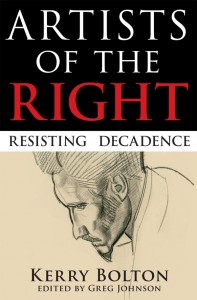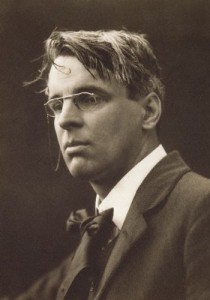Remembering William Butler Yeats:
June 13, 1865–January 28, 1939
Greg Johnson
187 words
William Butler Yeats, the Irish poet, playwright, and politician, was born on this day in 1865. One of the greatest literary figures of the 20th century, Yeats’ life and work straddle the great divide between Romanticism and Modernism. He received the Nobel Prize for Literature in 1923.
In life and in art, Yeats rejected modern rationalism, materialism, and egalitarianism. He saw them as coarsening and brutalizing.
Spiritually, Yeats was drawn to mysticism and the occult, influenced in particular by Emanuel Swedenborg and William Blake. Politically, like so many great literary artists of the first half of the 20th century, Yeats was drawn to fascism. To learn more about Yeats’ life, art, and politics, see the following works on this site:

You can buy Kerry Bolton’s Artists of the Right here.
- Kerry Bolton, “W. B. Yeats” (from Artists of the Right)
- Jonathan Bowden, “W. B. Yeats“
- Nicholas R. Jeelvy, “Jonathan Bowden’s Reactionary Modernism“
- Greg Johnson, “Yeats’ Pagan Second Coming” (Translations: French, German, Spanish)
- Vic Olvir, “William Butler Yeats: A Poet for the West“
- James J. O’Meara, “Artist and Autist: Cowley in the Light of Neville, Part 2)
- George Orwell, “W. B. Yeats as Occult Fascist“
Share your favorite Yeats poems below.
* * *
Counter-Currents has extended special privileges to those who donate $120 or more per year.
- First, donor comments will appear immediately instead of waiting in a moderation queue. (People who abuse this privilege will lose it.)
- Second, donors will have immediate access to all Counter-Currents posts. Non-donors will find that one post a day, five posts a week will be behind a “paywall” and will be available to the general public after 30 days.
To get full access to all content behind the paywall, sign up here:
Paywall Gift Subscriptions
 If you are already behind the paywall and want to share the benefits, Counter-Currents also offers paywall gift subscriptions. We need just five things from you:
If you are already behind the paywall and want to share the benefits, Counter-Currents also offers paywall gift subscriptions. We need just five things from you:
- your payment
- the recipient’s name
- the recipient’s email address
- your name
- your email address
To register, just fill out this form and we will walk you through the payment and registration process. There are a number of different payment options.
Remembering%20William%20Butler%20Yeats%3A%20June%2013%2C%201865%E2%80%93January%2028%2C%201939
Enjoyed this article?
Be the first to leave a tip in the jar!
Related
-
Counter-Currents Radio Podcast No. 584: The Counter-Currents Book Club — Jim Goad’s Whiteness: The Original Sin
-
Nowej Prawicy przeciw Starej Prawicy, Rozdział 6: Znaczenie filozofii dla zmiany politycznej
-
Nowej Prawicy przeciw Starej Prawicy, Rozdział 5: Refleksje nad Pojęciem polityczności Carla Schmitta
-
Remembering Bill Hopkins
-
Nowej Prawicy przeciw Starej Prawicy, Rozdział 4: Teoria i praktyka
-
The Union Jackal, April 2024
-
Nowej Prawicy przeciw Starej Prawicy, Rozdział 3: Metapolityka i wojna tajemna
-
Counter-Currents Radio Podcast No. 583: Judd Blevins on His Recall and Pro-White Politics

5 comments
Before I knew anything I knew I liked Yeats — actually like isn’t the right word, more like I knew he was trying to tell me something important that I heard but didn’t yet understand, was a little afraid to know, but needed to know.
The two I remember that hit me hard so long ago:
(Beautiful, frightening, the ring – hammer on anvil smashing illusions – of truth)
“THE SECOND COMING
TURNING and turning in the widening gyre
The falcon cannot hear the falconer;
Things fall apart; the centre cannot hold;
Mere anarchy is loosed upon the world,
The blood-dimmed tide is loosed, and everywhere
The ceremony of innocence is drowned;
The best lack all conviction, while the worst
Are full of passionate intensity.
Surely some revelation is at hand;
Surely the Second Coming is at hand.
The Second Coming! Hardly are those words out
When a vast image out of Spiritus Mundi
Troubles my sight: somewhere in sands of the desert
A shape with lion body and the head of a man,
A gaze blank and pitiless as the sun,
Is moving its slow thighs, while all about it
Reel shadows of the indignant desert birds.
The darkness drops again; but now I know
That twenty centuries of stony sleep
Were vexed to nightmare by a rocking cradle,
And what rough beast, its hour come round at last,
Slouches towards Bethlehem to be born?”
And, please pardon me for posting two:
(Made me think for the first time explicitly about choosing the value of life as lived – quality of life versus quantity I guess )
“AN IRISH AIRMAN FORESEES HIS DEATH
I know that I shall meet my fate
Somewhere among the clouds above;
Those that I fight I do not hate
Those that I guard I do not love;
My country is Kiltartan Cross,
My countrymen Kiltartan’s poor,
No likely end could bring them loss
Or leave them happier than before.
Nor law, nor duty bade me fight,
Nor public men, nor cheering crowds,
A lonely impulse of delight
Drove to this tumult in the clouds;
I balanced all, brought all to mind,
The years to come seemed waste of breath,
A waste of breath the years behind
In balance with this life, this death.”
There are so many more I found later, deep, subtle, some lighter hearted, all delightful and rewarding, but I these two as my favorites because I stumbled upon them somehow against the odd when young and uninstructed, these gifts from a man I never knew, a man gone but not forgotten, who went to the effort to refine and communicate to others unknown, in generations to come, his glittering facets of truth.
And thanks for posting this article which led me to spend a few minutes in beauty before plunging back into my mundane (if beautiful in other ways), work of the day.
Aedh Wishes for the Cloths of Heaven
Had I the heavens’ embroidered cloths,
Enwrought with golden and silver light,
The blue and the dim and the dark cloths
Of night and light and the half light,
I would spread the cloths under your feet:
But I, being poor, have only my dreams;
I have spread my dreams under your feet;
Tread softly because you tread on my dreams.
I do not have a poem but a recommendation: Cuchulain of Muirthemne, the story of the men of the Red Branch of Ulster, arranged and put into English by Lady Gregory. With a preface by W. B. Yeats (1902). In that preface, he declared the book to be “the best that has come out of Ireland in my time.”
Has there ever been a satisfactory explanation for A Stick of Incense ?
Yes, he is a great poet. He got the Nobel Prize for Literature when it still meant something and he served it. Tom Wolfe (the later one who wrote “The Bonfire of the Vanities”not the earlier one wrote “Look Homeward Angel) never got it. Given that they can pass over the greatest writer in American History (the later Tom Wolfe who also wrote “The Right Stuff”, “A Man in Full”, “I am Charlotte Simmons, etc) while giving the prize to the likes of Toni Morrison, it clearly doesn’t mean much any more.
Comments are closed.
If you have Paywall access,
simply login first to see your comment auto-approved.
Note on comments privacy & moderation
Your email is never published nor shared.
Comments are moderated. If you don't see your comment, please be patient. If approved, it will appear here soon. Do not post your comment a second time.